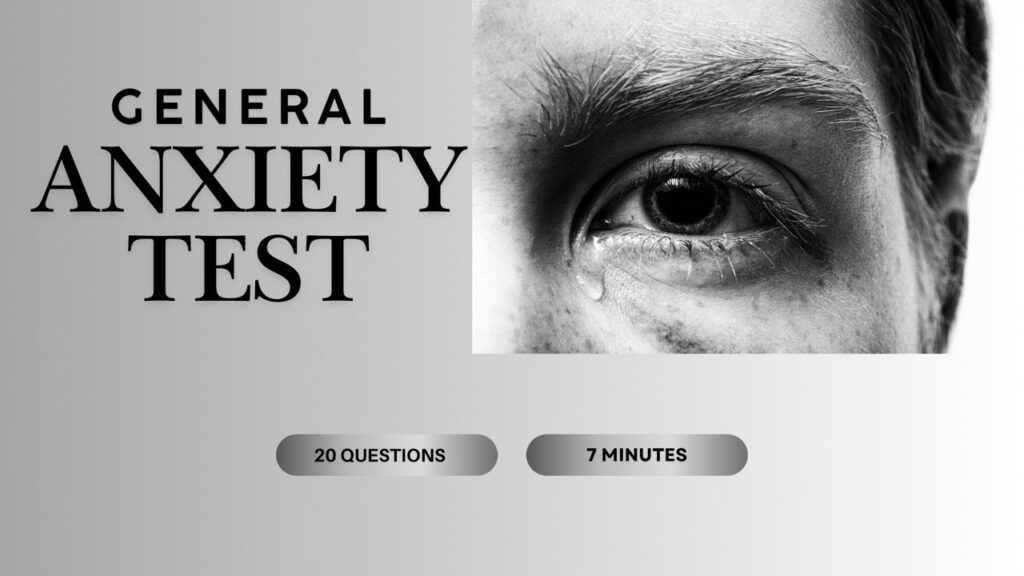
#1. I often feel tense, nervous, or restless.
#2. I frequently experience a sense of impending doom or worry about the future.
#3. I feel easily overwhelmed by minor problems or challenges.
#4. I often feel irritable or on edge without a specific reason.
#5. I feel unable to relax or find it difficult to calm down.
#6. My thoughts frequently race, making it hard to concentrate or focus.
#7. I constantly replay conversations or events in my head, worrying about what I said or did.
#8. I tend to expect the worst possible outcome in most situations.
#9. I feel like I can’t control my worry, even when I try to distract myself.
#10. I avoid situations or tasks that I think might make me anxious.
#11. I often experience muscle tension or tightness, especially in my neck, shoulders, or jaw.
#12. I frequently have trouble sleeping, either falling asleep or staying asleep due to worry.
#13. I experience rapid heartbeat, sweating, or shortness of breath during stressful situations.
#14. I feel nauseous, dizzy, or lightheaded when I’m anxious.
#15. I experience frequent headaches or stomachaches related to stress.
#16. I don’t find myself procrastinating or avoiding tasks because they seem too stressful.
#17. I often fidget, pace, or perform other nervous habits (e.g., tapping, nail-biting).
#18. I don’t rely on coping mechanisms like overeating, smoking, or alcohol to reduce stress.
#19. I find it hard to make decisions due to overthinking and second-guessing myself.
#20. I avoid social interactions because I feel anxious or fear judgment.
Results
“Your Results Indicate Low Anxiety Levels”
Your score suggests that you generally feel calm and composed in most situations. Anxiety does not significantly affect your daily life, and you have effective coping mechanisms for managing occasional stress.
What You Can Do:
- Maintain your current stress management techniques.
- Engage in regular activities that promote relaxation, such as yoga, exercise, or mindfulness.
- Stay mindful of changes in your stress levels, and address potential triggers proactively.
Encouragement:
Continue nurturing your emotional well-being and building resilience. Maintaining a balanced lifestyle will help you stay grounded and manage any challenges that arise.
“Your Results Indicate Moderate Anxiety Levels”
Your score suggests that you experience occasional anxiety, which might cause some disruption in your daily life. While you can manage most situations, certain stressors may feel overwhelming at times.
What You Can Do:
- Identify your main stress triggers and work on strategies to manage them.
- Practice relaxation techniques such as deep breathing or meditation to calm your mind.
- Engage in activities that help reduce stress, like regular exercise or creative hobbies.
- Consider speaking with a therapist or counselor for additional coping strategies if needed.
Encouragement:
You have the capacity to manage your anxiety effectively. With small adjustments and consistent practice, you can enhance your emotional well-being and build confidence in handling challenges.
“Your Results Indicate High Anxiety Levels”
Your score suggests that anxiety has a significant impact on your daily life, making certain situations or tasks challenging. You may feel overwhelmed by stress and have difficulty finding effective ways to manage it.
What You Can Do:
- Explore relaxation and grounding techniques such as progressive muscle relaxation, mindfulness, or journaling.
- Seek support from a trusted friend, family member, or mental health professional.
- Consider integrating lifestyle changes, such as better sleep habits, regular physical activity, and a balanced diet.
- Use self-help resources, such as books or apps, to learn more about anxiety management.
Encouragement:
Your score reflects your current challenges, but it’s important to know that anxiety is manageable with the right tools and support. Taking steps toward managing your stress can lead to a more balanced and fulfilling life.
“Your Results Indicate Very High Anxiety Levels”
Your score suggests that anxiety significantly affects your daily life, making it difficult to cope with stress and challenges. This level of anxiety can be overwhelming and may require professional intervention for effective management.
What You Can Do:
- Seek guidance from a mental health professional, such as a therapist or counselor. They can help you identify the root causes of your anxiety and develop personalized strategies to address it.
- Practice self-compassion and remind yourself that seeking help is a strength, not a weakness.
- Focus on small, manageable steps to regain a sense of control over your thoughts and emotions.
- Engage in calming activities, like mindfulness, art, or spending time in nature, to soothe your mind.
Encouragement:
You are not alone in this journey. Many people experience similar struggles, and with the right support and tools, you can regain control and improve your well-being. Taking the first step to seek help is a powerful move toward a healthier, happier life.


